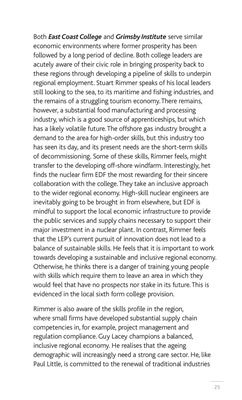
25
Both East Coast College and Grimsby Institute serve similar
economic environments where former prosperity has been
followed by a long period of decline. Both college leaders are
acutely aware of their civic role in bringing prosperity back to
these regions through developing a pipeline of skills to underpin
regional employment. Stuart Rimmer speaks of his local leaders
still looking to the sea, to its maritime and fishing industries, and
the remains of a struggling tourism economy. There remains,
however, a substantial food manufacturing and processing
industry, which is a good source of apprenticeships, but which
has a likely volatile future. The offshore gas industry brought a
demand to the area for high-order skills, but this industry too
has seen its day, and its present needs are the short-term skills
of decommissioning. Some of these skills, Rimmer feels, might
transfer to the developing off-shore windfarm. Interestingly, het
finds the nuclear firm EDF the most rewarding for their sincere
collaboration with the college. They take an inclusive approach
to the wider regional economy. High-skill nuclear engineers are
inevitably going to be brought in from elsewhere, but EDF is
mindful to support the local economic infrastructure to provide
the public services and supply chains necessary to support their
major investment in a nuclear plant. In contrast, Rimmer feels
that the LEP's current pursuit of innovation does not lead to a
balance of sustainable skills. He feels that it is important to work
towards developing a sustainable and inclusive regional economy.
Otherwise, he thinks there is a danger of training young people
with skills which require them to leave an area in which they
would feel that have no prospects nor stake in its future. This is
evidenced in the local sixth form college provision.
Rimmer is also aware of the skills profile in the region,
where small firms have developed substantial supply chain
competencies in, for example, project management and
regulation compliance. Guy Lacey champions a balanced,
inclusive regional economy. He realises that the ageing
demographic will increasingly need a strong care sector. He, like
Paul Little, is committed to the renewal of traditional industries